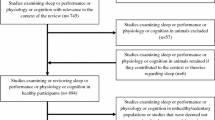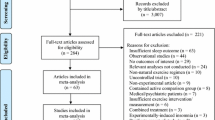Abstract
To verify the combined and isolated effects of alcohol consumption and one night of sleep deprivation on maximal strength, muscle endurance and aerobic performance. Also, to verify the association between perceived fatigue and exercise performance. Ten male participants were randomized into four conditions: (1) placebo consumption + normal sleep (PLA + SLE); (2) alcohol consumption + normal sleep (ALC + SLE); (3) placebo consumption + sleep deprivation (PLA + SDP), and (4) alcohol consumption + sleep deprivation (ALC + SDP). In each condition, participants ingested 1 g of alcohol per kg of body mass of alcoholic beer or non-alcoholic beer (placebo, 0% of alcohol), followed by one night of normal sleep or sleep deprivation. In the next morning, hangover symptoms, maximal strength, and time to exhaustion during muscle endurance test for elbow flexors (TTEEF) were performed concurrently to biceps brachii activation. Finally, participants performed a time to exhaustion aerobic test (TTEAER) on a treadmill with heart rate (HR) and perceived exertion (RPE) assessments. Fatigue and total symptoms of hangover were higher in ALC + SDP compared to PLA + SLE (p = 0.008). No differences were observed between conditions on maximal strength, TTEEF, TTEAER, muscle activation, HR and RPE during tests (p > 0.05). Higher perceived fatigue was significantly associated only with shorter TTEAER (r = − 0.36; p = 0.02). Alcohol consumption, combined or not with total sleep deprivation did not impair maximal strength, muscle endurance and aerobic performance. Higher perceived fatigue seems to impair long-duration activities.




Similar content being viewed by others
References
Shirreffs SM, Maughan RJ. The effect of alcohol on athletic performance. Curr Sports Med Rep. 2006;5:192–6.
Javaheripour N, Shahdipour N, Noori K, Zarei M, Camilleri JA, Laird AR, et al. Functional brain alterations in acute sleep deprivation: an activation likelihood estimation meta-analysis. Sleep Med Rev. 2019;46:64–73.
Barnes MJ. Alcohol: impact on sports performance and recovery in male athletes. Sports Med. 2014;44(7):909–19.
Fullagar HH, Skorski S, Duffield R, Hammes D, Coutts AJ, Meyer T. Sleep and athletic performance: the effects of sleep loss on exercise performance, and physiological and cognitive responses to exercise. Sports Med. 2015;45:161–86.
Blumert PA, Crum AJ, Ernsting M, Volek JS, Hollander DB, Haff EE, et al. The acute effects of twenty-four hours of sleep loss on the performance of national-caliber male collegiate weightlifters. J Strength Cond Res. 2007;21:1146–54.
Rodrigues R, Franke RA, Teixeira BC, Macedo RCO, Lopes AL, Reischak-Oliveira A, et al. Combined and isolated effects of alcohol intake and one night of sleep deprivation on mood states, hormonal and inflammatory responses in healthy male adults: a crossover randomized controlled trial. Chin J Physiol. 2017;60:327–37.
Rohsenow DJ, Howland J, Arnedt JT, Almeida AB, Greece J, Minsky S, et al. Intoxication with bourbon versus vodka: effects on hangover, sleep, and next-day neurocognitive performance in young adults. Alcohol Clin Exp Res. 2010;34:509–18.
Eckardt MJ, File SE, Gessa GL, Grant KA, Guerri C, Hoffman PL, et al. Effects of moderate alcohol consumption on the central nervous system. Alcohol Clin Exp Res. 1998;22:998–1040.
Satterfield BC, Wisor JP, Schmidt MA, Van Dongen HPA. Time-on-task effect during sleep deprivation in healthy young adults is modulated by dopamine transporter genotype. Sleep. 2017;40:zsx167.
Nardone R, Bergmann J, Christova M, Lochner P, Tezzon F, Golaszewski S, et al. Non-invasive brain stimulation in the functional evaluation of alcohol effects and in the treatment of alcohol craving: a review. Neurosci Res. 2012;74:169–76.
Kong D, Liu R, Song L, Zheng J, Zhang J, Chen W. Altered long- and short-range functional connectivity density in healthy subjects after sleep deprivations. Front Neurol. 2018;9:546.
Halson SL. Sleep in elite athletes and nutritional interventions to enhance sleep. Sports Med. 2014;44(Suppl 1):13–23.
Barnes MJ, Mundel T, Stannard SR. The effects of acute alcohol consumption and eccentric muscle damage on neuromuscular function. Appl Physiol Nutr Metab. 2012;37:63–71.
Prentice C, Stannard SR, Barnes MJ. Effects of heavy episodic drinking on physical performance in club level rugby union players. J Sci Med Sport. 2015;18(3):268–71.
Vaara JP, Oksanen H, Kyrolainen H, Virmavirta M, Koski H, Finni T. 60-Hour sleep deprivation affects submaximal but not maximal physical performance. Front Physiol. 2018;9:1437.
Poulsen MB, Jakobsen J, Aagaard NK, Andersen H. Motor performance during and following acute alcohol intoxication in healthy non-alcoholic subjects. Eur J Appl Physiol. 2007;101:513–23.
Arnal PJ, Lapole T, Erblang M, Guillard M, Bourrilhon C, Leger D, et al. Sleep extension before sleep loss: effects on performance and neuromuscular function. Med Sci Sports Exerc. 2016;48:1595–603.
Kruisselbrink LD, Martin KL, Megeney M, Fowles JR, Murphy RJ. Physical and psychomotor functioning of females the morning after consuming low to moderate quantities of beer. J Stud Alcohol. 2006;67:416–20.
Ferreira SE, de Mello MT, Rossi MV, Souza-Formigoni ML. Does an energy drink modify the effects of alcohol in a maximal effort test? Alcohol Clin Exp Res. 2004;28:1408–12.
Temesi J, Arnal PJ, Davranche K, Bonnefoy R, Levy P, Verges S, et al. Does central fatigue explain reduced cycling after complete sleep deprivation? Med Sci Sports Exerc. 2013;45:2243–53.
Lipperman-Kreda S, Paschall MJ, Robert FS, Morrison CN. Places and social contexts associated with simultaneous use of alcohol, tobacco and marijuana among young adults. Drug Alcohol Rev. 2019;37:188–95.
Vakulin A, Baulk SD, Catcheside PG, Anderson R, van den Heuvel CJ, Banks S, et al. Effects of moderate sleep deprivation and low-dose alcohol on driving simulator performance and perception in young men. Sleep. 2007;30:1327–33.
Van Cutsem J, Marcora S, De Pauw K, Bailey S, Meeusen R, Roelands B. The effects of mental fatigue on physical performance: a systematic review. Sports Med. 2017;47:1569–88.
Rodrigues R, Franke RA, Teixeira BC, CauduroOliveiraMacedo R, Diefenthaeler F, Baroni BM, et al. Can the combination of acute alcohol intake and one night of sleep deprivation affect neuromuscular performance in healthy male adults? A cross-over randomized controlled trial. J Strength Cond Res. 2019;33:1244–51.
Horne JA, Ostberg O. A self-assessment questionnaire to determine morningness–eveningness in human circadian rhythms. Int J Chronobiol. 1976;4:97–110.
Babor TF, Higgins-Biddle, John C, Saunders, John B, Monteiro, Maristela G, World Health Organization. Dept. of Mental Health and Substance Dependence. In: World Health Organization. AUDIT: the alcohol use disorders identification test: guidelines for use in primary health care. 2nd ed. Geneva; 2001.
Cunha GS, Vaz MA, Geremia JM, Leites GT, Baptista RR, Lopes AL, et al. Maturity status does not exert effects on aerobic fitness in soccer players after appropriate normalization for body size. Pediatr Exerc Sci. 2016;28:456–65.
SENIAM. Surface ElectroMyoGraphy for the Non-Invasive Assessment of Muscles. http://www.seniam.org/2017.
Mann T, Lamberts RP, Lambert MI. Methods of prescribing relative exercise intensity: physiological and practical considerations. Sports Med. 2013;43:613–25.
Cohen J. Statistical power analysis for the behavioral sciences. 2nd ed. Hillsdale: Lawrence Erlbaum Associates; 1988.
Bonnar D, Bartel K, Kakoschke N, Lang C. Sleep interventions designed to improve athletic performance and recovery: a systematic review of current approaches. Sports Med. 2018;48:683–703.
Van Dongen HPA, Rogers NL, Dinges DF. Sleep debt: theoretical and empirical issues. Sleep Biol Rhythms. 2003;1:5–13.
Enoka RM, Duchateau J. Translating fatigue to human performance. Med Sci Sports Exerc. 2016;48:2228–38.
Brown DMY, Graham JD, Innes KI, Harris S, Flemington A, Bray SR. Effects of prior cognitive exertion on physical performance: a systematic review and meta-analysis. Sports Med. 2020;50:497–529.
Azevedo R, Silva-Cavalcante MD, Gualano B, Lima-Silva AE, Bertuzzi R. Effects of caffeine ingestion on endurance performance in mentally fatigued individuals. Eur J Appl Physiol. 2016;116:2293–303.
Acknowledgements
This work was conducted during the course of a scholarship supported by the International Cooperation Program CAPES/COFECUB at the Federal University of Rio Grande do Sul, financed by CAPES—Brazilian Federal Agency for Support and Evaluation of Graduate Education within the Ministry of Education of Brazil and the National Council of Scientific and Technological Development (CNPq) Brazil for the provision of scholarships (FD, ARO, BMB and MAV).
Funding
This work was supported by the Fundação de Amparo à Pesquisa do Estado do Rio Grande do Sul (FAPERGS) under Grant [number 12/2115-6].
Author information
Authors and Affiliations
Corresponding author
Ethics declarations
Conflict of interest
The authors report no conflicts of interest.
IRB approval
University’s Ethics Committee of Human Research number 366.465.
Additional information
Publisher's Note
Springer Nature remains neutral with regard to jurisdictional claims in published maps and institutional affiliations.
Rights and permissions
About this article
Cite this article
Rodrigues, R., de Azevedo Franke, R., Teixeira, B.C. et al. Combined and isolated effects of alcohol consumption and sleep deprivation on maximal strength, muscle endurance and aerobic exercise performance in healthy men: a cross-over randomized controlled trial. Sleep Biol. Rhythms 19, 433–441 (2021). https://doi.org/10.1007/s41105-021-00333-w
Received:
Accepted:
Published:
Issue Date:
DOI: https://doi.org/10.1007/s41105-021-00333-w




